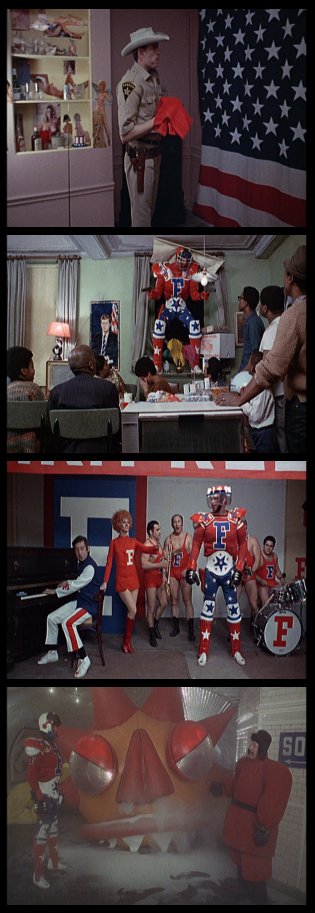
No one loves America bashing more than me. Okay, that's probably not true. I'd probably get an argument from anyone who had their apartment blown up by a stray cruise missile or who had the misfortune of being collateral damage in Fallujah during a "legal" dispersal of white phosphorous. So what? Those people probably don't even own a DVD player.
Given that, if anyone is going to enjoy some laughs at America's expense, it should be me. Hell, I even thought The Smothers Brothers were almost funny, so it's not like I've set a lofty benchmark. That's why I was all over this one, particularly when I looked at the cast and saw Donald Pleasance as Doctor Freedom, Yves Montand as Captain Formidable, and Serge Gainsbourg as Mr. Drugstore. Throw in my naive assumption that Criterion would never waste time with a piece of frozen dog shit as ill conceived as Mr. Freedom, and all the dominos were in place for a wasted evening.
It didn't take long for apprehension to plop its ass down next to me on the sofa and prop its feet up on the coffee table. Generally, the use of wall hangings in movies which imply political context is a signal that somebody didn't want to bother writing a script with more narrative heft than a Clutch Cargo episode. You know the routine. Rednecks have Bigmouth Billy Bass singing fish. Lesbian sculptors have have framed Frida Kahlo prints. In this case, Mr. Freedom is a sheriff with Playboy centerfolds and a photo of Lyndon Johnson hanging behind his desk. There's also a poster accusing JFK of treason, since we all know Kennedy had absolutely nothing to do with U.S. involvement in Vietnam. The sheriff opens a closet and reveals his Mr. Freedom costume, kind of like Yvonne Craig in Batman, only with hand grenades, daggers, and a rubber LBJ mask instead of a vanity and a wig. He puts on his uniform and then goes to an apartment where some black people are having a party. They have Malcolm X and Mohammed Ali posters, and they're listening to Aretha Franklin, so we can be sure that they're black. They also have a framed JFK in velvet, since he had nothing to do with Vietnam. Mr. Freedom jumps on the table, shoots their television, sings an annoying song about freedom, and kicks some soft drinks on the floor. Just then he receives a call on his television wristwatch from Donald Pleasance. He wants Mr. Freedom to go to France to save it from Communism, since they're white and therefore worth saving, even though they're French. Need I go on? To director William Klein, the word "subtle" is two syllables, one of which represents a sandwich, and the other containing three arbitrary letters which might someday be useful in other words if needed.
Donald Pleasance only appears on TV screens, which makes me wonder if he was even required to leave his apartment to participate in this cluster fuck. But to his credit, he doesn't just phone in a half assed performance, and manages to muster more enthusiasm for his role than is warranted. Serge Gainsbourg is completely wasted, and it's not even clear why he's called Mr. Drugstore, although the fact that he's called Mr. Drugstore is by far the funniest gag. Yves Montand receives approximately two seconds of screen time as a corpse. And oh yes, there are also loads of gratuitous tits to distract you from the fact that the script appears to have been constructed by a tenth grader with an addiction to shoe polish.
I suppose if I were to compare this to something, it would be Ray Dennis Steckler's Rat Pfink and Boo Boo, if you made it significantly less funny, tripled the costume budget, and stirred in a few gallons of the sort of knee jerk leftist drooling one normally encounters in the comments section on Huffington Post. It all makes me wonder whether Henry Kissinger really didn't sabotage the peace talks in Paris. Maybe he flew there to work behind the scenes, making sure this film was completed. Maybe he was crawling around with Irving Kristol in the giant inflatable dragon used to represent the Chinese government. Maybe I shouldn't have rented this movie. It's the kind of social protest that makes John & Yoko's bed-in for peace seem as ballsy as the guy standing in front of the tank at Tiananmen Square, and if it's truly representative of the satirical wit brought to bear against America's foreign policy in the 1960s, then it's amazing that the Vietnam War ever ended.

No comments